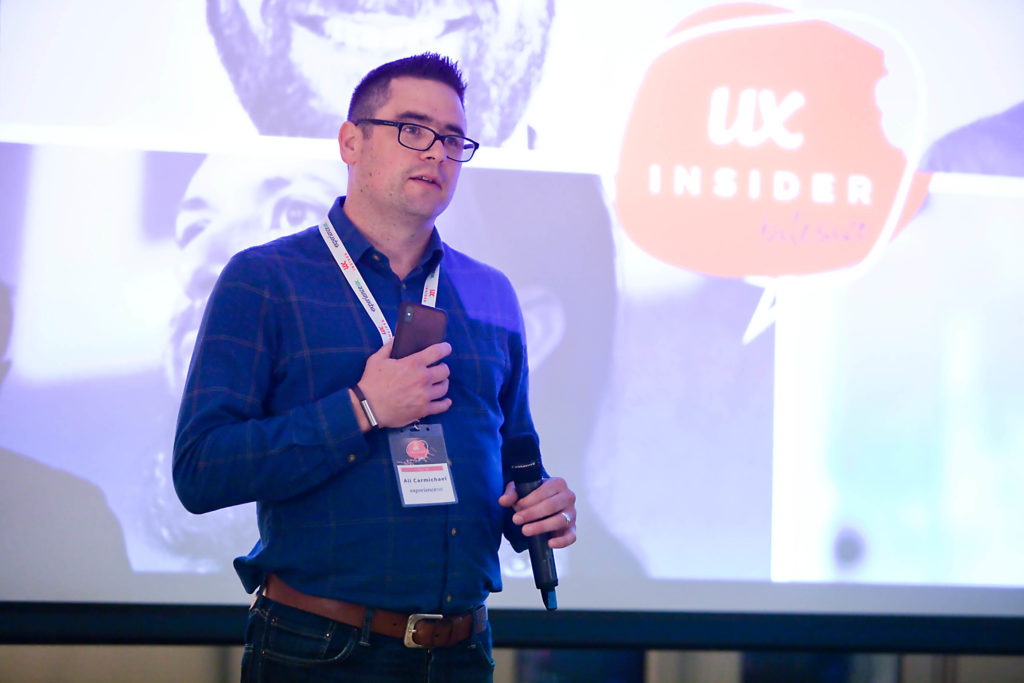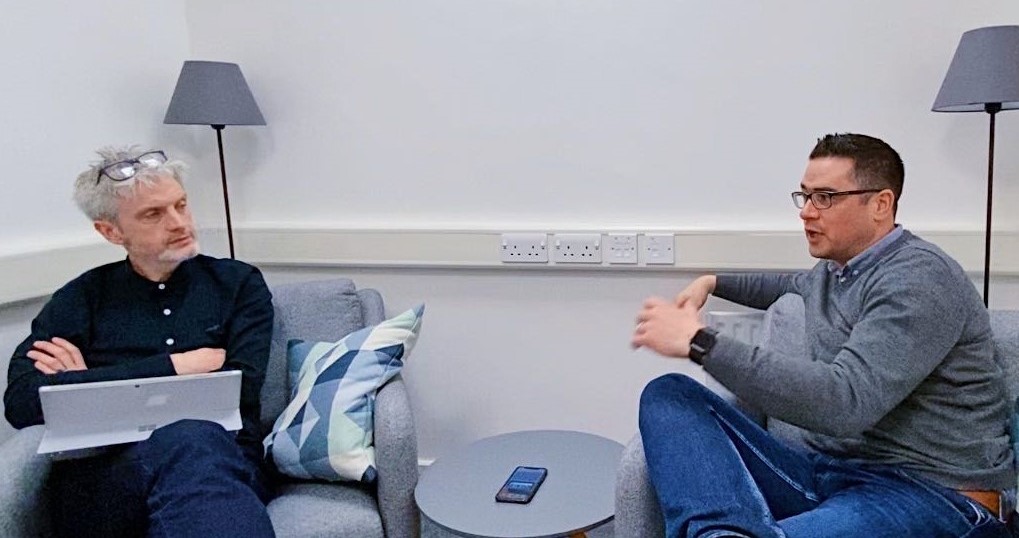With big change comes big opportunity. A month after our co-founder Ali Carmichael confirmed that he is taking on the reigns as Managing Director and Owner of Experience UX, he sat down with Dave McRobbie to share some insight into his thoughts on the opportunity, and his ideas for the direction of the business.
What excites and scares you about becoming the sole owner of a business?
Moving from a partnership model to running the business on my own is, personally, a big change. However, whilst there’s a lot of responsibility suddenly, the team hasn’t changed, and they’re invested in the company and where we want to take it. We’ve built up a great reputation and gained great experience, so in many respects, little has changed in the day to day.
Most of my feelings are of excitement for the opportunity, but the ownership process, and where I’m at, isn’t without feelings of dread at times. I’ve certainly had moments of, “Oh wow, the enormity of it”.
What I will miss is not having a partner to use as a sounding board, to download to, and someone I can talk to and feel safe with – because we’re both in the business together.
I’m excited about seeing my vision down on paper, then utilising that vision and being able to work with the team to build on that – working as a team towards achieving great things.
What is forming as your vision for EUX?
It’s all about people, but it always has been about people and understanding behaviour. UX is a great enabler of that because I can work in digital. I’ve always worked in digital, so the UX aspect has allowed me to focus on people within the digital space.
The CX (Customer Experience) space allows us to look beyond digital; look at forecasting of lifecycles and forecasting of journeys, and it’s still all about people.
With 12 years of researching user behaviour, we can leverage our experience to focus on human behaviour and demonstrate why it is fundamental to successful business practice. That’s what I’m really interested in, that’s what my team are really interested in, so how can I utilise that passion and shape it into a business that we continue to connect with?
Year on year, for the last three years, customer satisfaction is decreasing*. How do you cut through the noise and allow businesses to start to rectify that?
Although ‘customer experience’ is on the agenda at Board level, it is easy to confuse customer experience, customer satisfaction, and customer service with strategy. We assume it is an objective in its own right, but that won’t hold any long-term value.
Secondly, there is too much reliance on data and setting customer experience targets based on numbers. Data is a great indicator to report what is going on and what has happened, but we rarely establish the ‘why’ from the data. People aren’t numbers. Understanding the ‘Why’ opens a window into how a brand, a product, or a service, is perceived and engaged with at a level no data is able to reach.
We don’t want to dismiss ‘customer experience’ from the conversation, and we shouldn’t shy away from the important numbers, but rather than talking about customer experience in the context of; “How can we improve business? How can we get our numbers up? How can we create a USP?”, customer experience needs to be an ethos, lived and breathed, if it is to have a far-reaching positive impact on business.
I’d like to help companies achieve a true human focus to business practice that cuts through the noise and improves the return on the customer lifetime value.
This often begins with a pragmatic approach to understanding people as customers; their needs and wants, their intrinsic motivations, how they perceive and approach a product or service, and their experience through the transition. We can build great things from there.
If you look at younger generations’ rapid adoption of tech do you think the Don Norman Quote about ‘tech moving fast, people moving slowly’, is still relevant?
Younger generations will always adapt quickly to new technology because they don’t have to unlearn habits and behaviours. As these generations age, and then must adapt to change themselves, we’ll see what impact today’s technology has on peoples’ ability to move faster.
I feel that technology can result in making us seem to be faster, but there is a trade-off . Email is a great example – when I did business studies at GCSE we were taught how to write a memo. You would write a note, in a certain format, that would get posted off around the business. You would then wait a while to receive a reply. In the meantime, you can get on with some work. Everything is so immediate now and therefore expectation is high. This increases the pressure we place on ourselves and what we invariably place on other people.
When new technology arrives to somehow improve our lives, rather than easing the strain, it can encourage a change in our expectations. We suddenly need to deliver a whole lot more in a shorter space of time. The impact is more stress in the workplace, which can lead to an increase in mental health issues. Is this a trade-off we’re willing to accept? We need technology to help us work smarter, not faster.
Does that mean that your business moves from looking at transactions to focusing on the impact on an individual?
Yes, but it’s not about the transactions, it’s about the transitions.
Understanding and owning the transition is a responsibility, one that results in businesses not being there just to sell people stuff but to help customers navigate from, and back to, their everyday lives.
I don’t want any doubt if, when in a transaction, I buy something and there’s a jarring transition. For example, a message to say “Your form has been submitted” is a small but significant improvement in the experience. If I don’t receive any confirmation, I’ll then spend the rest of the evening worrying about whether they have my order, which can build into some anxiety, maybe it was a dodgy site and I’ve lost my money. Then I must calculate how I’m going to find time to phone them tomorrow with every expectation that I’ll be stuck on hold for 30 minutes.
All that negative reaction, due to poor understanding or, in this case, a lack of care in the transition, demonstrates why businesses need to be responsible for the transitions, not just the interaction and not just the transaction.
If companies pay attention to the transitions, they can design a holistic experience that, as a result, improves the original service offering.
So, do you think we need to start adding friction to these interactions?
Absolutely. Though I often advise removing friction, we do need to include positive friction to allow people to think properly.
I find it is so easy, in a state of tiredness and therefore being glued to my phone, to get drawn into an advert that’s relevant, to then being carried along a journey to a page about something that I’m interested in but not necessarily thinking about purchasing right now. But oh, it looks like a really good deal and… and then I find myself making a purchase.
Fine, yes, I can return it but I’d prefer to have a little bit of friction to allow me to think about it? Now business isn’t going to react positively initially, because business needs revenue, but if you design an engagement journey around this experience, a stronger and longer-term relationship can be created, increasing the customer lifecycle value. I might still buy it, and I’d be happier about it.
With all this in mind, how do you see EUX developing over the next few years?
I’d like us to have a bigger influence. How can we encourage businesses to focus on people and demonstrate an increase in customer lifecycle value? We’re very much about understanding people from a pragmatic perspective, and I’d like to see that better represented in everyday business.
It would be fantastic to have a positive influence on a whole range of clients from small independent trades working in rural Dorset through to international brands. We want to demonstrate that successful and sustainable business can be achieved through a people-centric ethos.
The challenge comes with getting the message right and shaping up our products and services effectively. To have more influence we need to be ready to scale and so I’m interested in creating a business model that works.
Internally at Experience UX, we’ve often talked about delivering a Win, Win, Win model. A Win for our client, a Win for their customer/user, and a Win for society. That view certainly hasn’t changed with me taking full ownership of the business.
* Source: The Institute of Customer Experience


